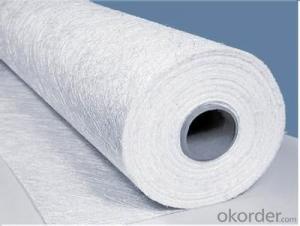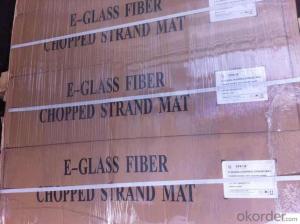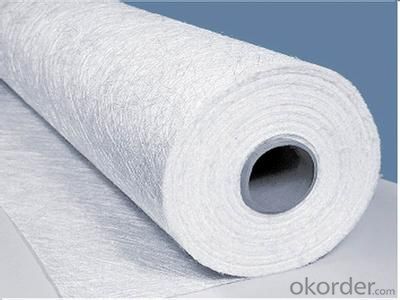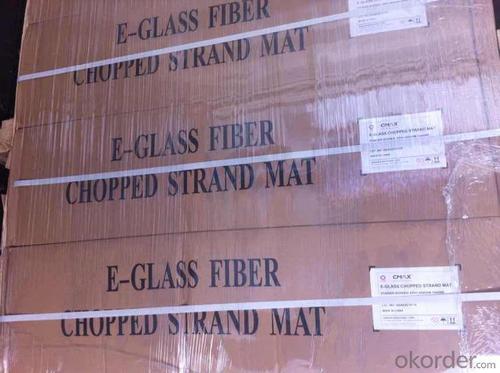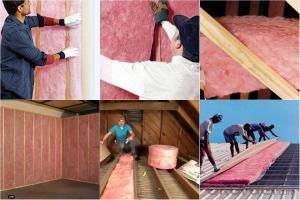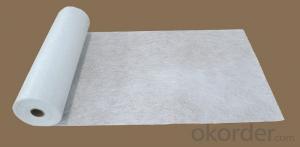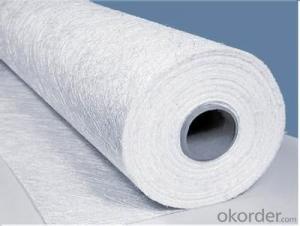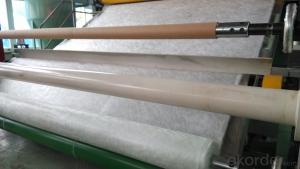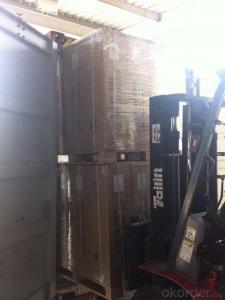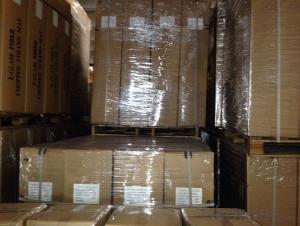Fiberglass Mat Tissue E Glass Emulsion Chopped Strand Mat for Hand Layup
- Loading Port:
- Shanghai
- Payment Terms:
- TT OR LC
- Min Order Qty:
- 10000 kg
- Supply Capability:
- 200000 kg/month
OKorder Service Pledge
OKorder Financial Service
You Might Also Like
1.Brief Introduction E-Glass Emulsion Chopped Strand Mat is made of randomly distributed chopped strands held tighter by a emulsion binder. It is compatible with UP, VE, EP resins.
The roll width ranges from 50mm to 3300mm.
Additional demands on wet-out and decomposition time may be available upon request.
2.Product Features
Fast breakdown in styrene
High tensile strength, allowing for use in hand lay-up process to produce large-area parts
Good wet-through and fast wet-out in resins, rapid air lease
Superior acid corrosion resistance
3.Product Specifications
Property | Area Weight | Moisture Content | Size Content | Breakage Strength | Width |
(%) | (%) | (%) | (N) | (mm) | |
Mathods | IS03374 | ISO3344 | ISO1887 | ISO3342 | |
EMC80E | ±7.5 | ≤0.20 | 8-12 | ≥40 | 50-3300 |
EMC100E | ≥40 | ||||
EMC120E | ≥50 | ||||
EMC150E | 4-8 | ≥50 | |||
EMC180E | ≥60 | ||||
EMC200E | ≥60 | ||||
EMC225E | ≥60 | ||||
EMC300E | 3-4 | ≥90 | |||
EMC450E | ≥120 | ||||
EMC600E | ≥150 | ||||
EMC900E | ≥200 |
Special specification can be produce according to customer requirements.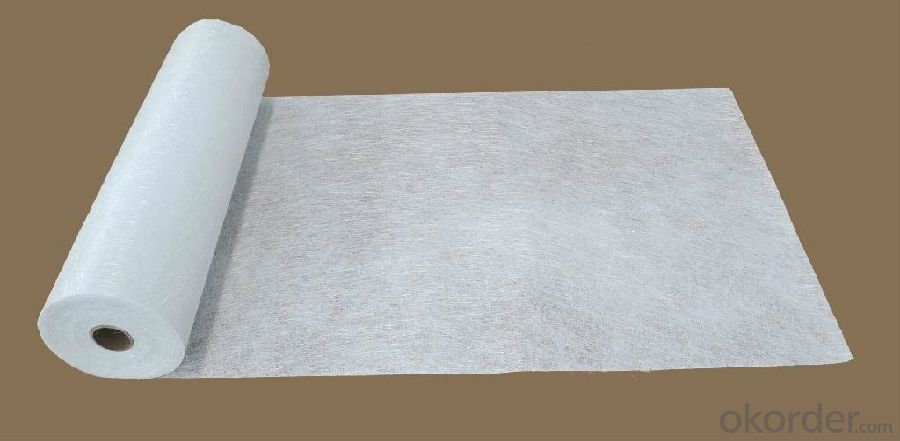 4.FAQ
4.FAQ
Packaging:
Each Chopped Strand Mat is wound onto a paper tube which has an inside diameter of 76mm and the mat roll has a diameter of 275mm. The mat roll is wrapped up with plastic film,and then packed in a cardboard box or wrapped up with kraft paper. The rolls can be vertically or horizontally placed. For transportation, the rolls can be loaded into a cantainer directly or on pallets.
Storage:
Unless otherwise specified, Chopped Strand Mat should be stored in a dry, cool and rain-proof area. It is recommended that the room temperature and humidity should be always maintained at 15℃~35℃ and 35%~65% respectively.
- Q: Are there any health risks associated with fiberglass mat tissue?
- Yes, there are potential health risks associated with fiberglass mat tissue. Fiberglass is made of tiny glass fibers that can be released into the air when the material is cut, sanded, or disturbed. When inhaled, these fibers can cause irritation to the skin, eyes, and respiratory system. Short-term exposure may result in symptoms such as coughing, wheezing, and difficulty breathing. Long-term exposure to fiberglass fibers has been linked to more serious health issues, including lung damage and an increased risk of developing respiratory conditions such as asthma or bronchitis. It is important to take proper precautions, such as wearing protective clothing, goggles, and a mask, when working with fiberglass mat tissue to minimize the risk of exposure and potential health problems.
- Q: How does fiberglass mat tissue perform in high temperatures?
- Fiberglass mat tissue performs well in high temperatures due to its inherent heat resistance properties. The mat is typically made from glass fibers that are woven together, creating a strong and durable material. These glass fibers have a high melting point, allowing the fiberglass mat tissue to withstand elevated temperatures without deforming or losing its structural integrity. When exposed to high temperatures, fiberglass mat tissue does not shrink, warp, or become brittle like other materials might. It retains its dimensional stability and mechanical strength, making it suitable for various applications in industries such as automotive, aerospace, construction, and insulation. Additionally, fiberglass mat tissue acts as a thermal insulator, offering protection against heat transfer. It can effectively resist heat conduction and radiation, helping to maintain the desired temperature in a given environment or prevent heat damage to surrounding components. Furthermore, fiberglass mat tissue is non-combustible, meaning it does not burn or produce toxic gases when exposed to fire. This makes it a reliable choice for applications that require fire resistance, such as fireproofing insulation or protective barriers. In summary, fiberglass mat tissue performs exceptionally well in high temperatures. Its heat resistance, dimensional stability, mechanical strength, thermal insulation properties, and non-combustible nature make it an excellent material for use in demanding environments where elevated temperatures are present.
- Q: Can fiberglass mat tissue be used for HVAC insulation?
- No, fiberglass mat tissue is not typically used for HVAC insulation. HVAC insulation usually requires materials that are specifically designed to have high thermal resistance and to prevent the transfer of heat or cold air. Fiberglass mat tissue is commonly used as a reinforcement material in the fabrication of composite materials, such as fiberglass panels or structures, rather than as insulation. Insulation materials for HVAC systems are typically made from materials like fiberglass insulation boards, foam insulation, or mineral wool, which have better thermal resistance properties and are specifically designed for HVAC applications.
- Q: Can fiberglass mat tissue be used for composite pipe manufacturing?
- Yes, fiberglass mat tissue can be used for composite pipe manufacturing. Fiberglass mat tissue provides reinforcement to the composite pipe, enhancing its strength, durability, and resistance to corrosion.
- Q: Can fiberglass mat tissue be used for attic insulation?
- No, fiberglass mat tissue is not typically used for attic insulation. It is more commonly used in the manufacturing of composite materials and as a reinforcement layer in fiberglass products. Attic insulation typically requires materials like fiberglass batts, cellulose, or spray foam insulation, which are designed specifically for thermal insulation purposes.
- Q: Is fiberglass mat tissue suitable for insulation in data centers?
- Yes, fiberglass mat tissue is a suitable material for insulation in data centers. It provides excellent thermal insulation properties, helping to maintain the desired temperature and prevent heat loss. Additionally, fiberglass is fire-resistant and can offer acoustic insulation, reducing noise levels in the data center. Overall, fiberglass mat tissue is a reliable and effective choice for insulation in data centers.
- Q: How does fiberglass mat tissue perform in terms of moisture vapor resistance?
- Fiberglass mat tissue is generally effective at resisting moisture vapor. It acts as a barrier, preventing the passage of water vapor and making it suitable for moisture control in applications like roofing and insulation. To enhance the moisture vapor resistance of fiberglass mat tissue, it can be combined with other materials like vapor barriers or moisture-resistant coatings. These additional layers provide extra protection against moisture infiltration, improving the overall performance of the fiberglass mat tissue. However, it should be noted that the moisture vapor resistance of fiberglass mat tissue can vary depending on factors such as thickness, density, and composition. Thicker and denser mats tend to offer higher resistance, while the presence of manufacturing additives or coatings can also affect the material's properties. In conclusion, fiberglass mat tissue is known for its moisture vapor resistance, but its performance may be influenced by various factors. It is recommended to consult product specifications or manufacturers' recommendations to determine the specific moisture vapor resistance of a particular fiberglass mat tissue product.
- Q: Is fiberglass mat tissue water-resistant?
- Indeed, fiberglass mat tissue exhibits water resistance. Fiberglass, a substance comprised of delicate glass fibers intricately woven into a mat, undergoes a process of being layered with a water-resistant substance, such as a resin or gel coat, in order to heighten its ability to repel water. The water-resistant coating acts as a barrier, preventing water from infiltrating the fiberglass mat, rendering it suitable for a wide range of applications that entail contact with water or moisture, such as the construction of boat hulls, shower stalls, and outdoor furniture. However, it is crucial to acknowledge that although fiberglass mat tissue possesses water resistance, it does not possess complete waterproofness. If not properly maintained or exposed to prolonged and excessive moisture, it may still absorb limited amounts of water over time.
- Q: How does fiberglass mat tissue contribute to the strength and durability of composite materials?
- The strength and durability of composite materials are greatly enhanced by fiberglass mat tissue. To begin with, the mat tissue acts as a reinforcement element, providing added strength and rigidity to the composite structure. The fibers in the mat tissue are usually made of glass, which possesses high tensile strength and stiffness. These fibers are arranged randomly, forming a three-dimensional network that evenly distributes stress throughout the composite material. This network of fibers helps to resist cracks and fractures, thus increasing the overall strength of the composite. Additionally, the mat tissue serves as a protective barrier against delamination, a common problem in composite materials. Delamination refers to the separation of layers within the composite, which can weaken its structural integrity. By bonding the layers together and improving their adhesion, the fiberglass mat tissue prevents delamination. This enhanced adhesion reduces the chances of interface failure and improves the overall durability of the composite material. Moreover, fiberglass mat tissue contributes to the improved impact resistance of composite materials. The random fiber orientation within the mat tissue creates a crisscross pattern that enhances the composite's ability to absorb and distribute impact energy. This characteristic makes the material less susceptible to damage from external forces, such as impacts, vibrations, or mechanical stress. In conclusion, fiberglass mat tissue plays a vital role in strengthening and enhancing the durability of composite materials. Its reinforcement capabilities, delamination prevention, and improved impact resistance make it an essential component in various industries, including automotive, aerospace, construction, and marine, where the demand for strong and durable materials is critical.
- Q: What is the thermal stability of fiberglass mat tissue?
- The ability of fiberglass mat tissue to endure high temperatures without significant degradation or loss of physical properties is referred to as its thermal stability. Fiberglass mat tissue is typically crafted from woven or non-woven glass fibers, renowned for their exceptional resistance to heat. Depending on the specific type and composition, fiberglass mat tissue can generally withstand temperatures ranging from approximately 100°C (212°F) to 500°C (932°F). At these temperatures, the glass fibers retain their strength, dimensional stability, and insulation properties. The thermal stability of fiberglass mat tissue holds great importance in diverse applications where exposure to high temperatures is anticipated. For instance, it is commonly employed in the construction industry for insulation purposes in buildings. This is because it has the capability to endure the heat generated by HVAC systems or fire. Furthermore, the thermal stability of fiberglass mat tissue is also vital in industries such as automotive, aerospace, and marine. In these industries, it is utilized for heat shielding, fire protection, and insulation in engine compartments, exhaust systems, and other environments with elevated temperatures. In conclusion, the thermal stability of fiberglass mat tissue establishes it as a dependable and long-lasting material choice for applications necessitating resistance to high temperatures. Its capacity to preserve its properties under extreme heat conditions guarantees enduring performance and safety across various industries.
Send your message to us
Fiberglass Mat Tissue E Glass Emulsion Chopped Strand Mat for Hand Layup
- Loading Port:
- Shanghai
- Payment Terms:
- TT OR LC
- Min Order Qty:
- 10000 kg
- Supply Capability:
- 200000 kg/month
OKorder Service Pledge
OKorder Financial Service
Similar products
Hot products
Hot Searches
Related keywords
